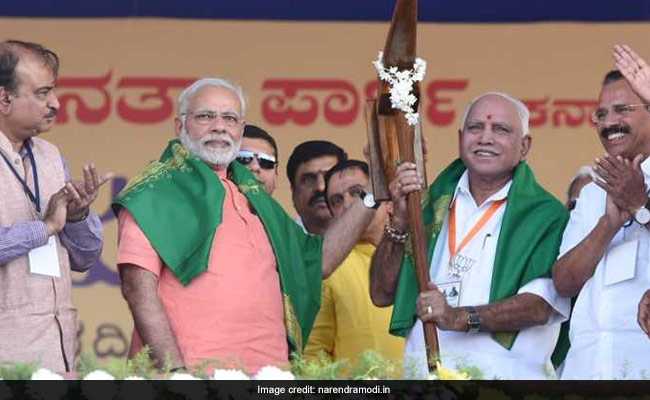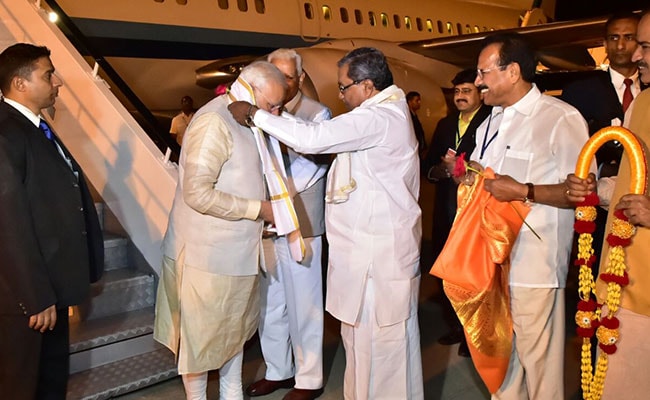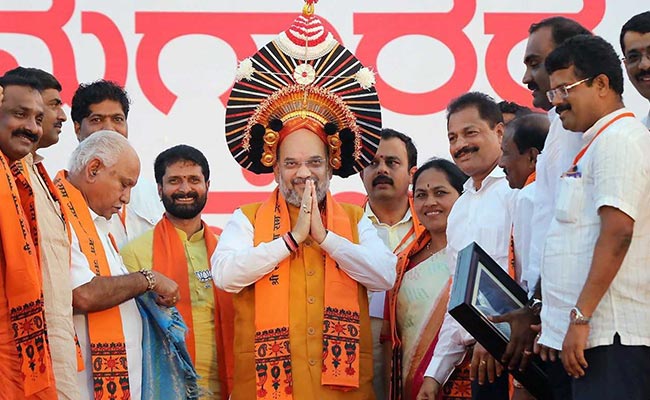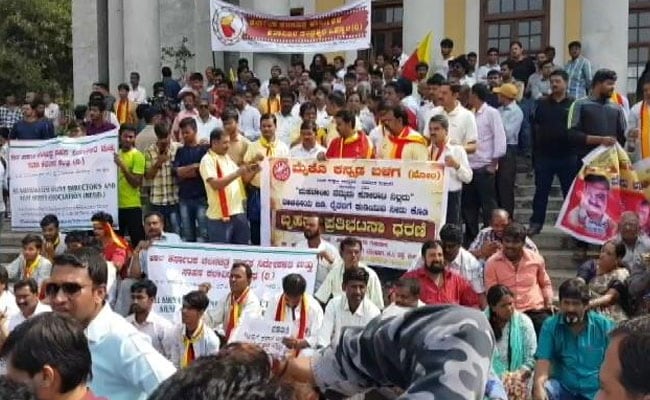The BJP is caught on a cleft stick on the Mahadayi (known as the Mandovi in Goa). Nearly four decades ago, the Karnataka government sought an answer to the severe drinking water and irrigation problems of the drought-ridden and perennially thirsty districts of of Belgavi (Belgaum), Vijaypura (Bijapur), Gadag, Haveri, Bagalkot and Dharwad, in addition to the twin cities of Hubbali (Hubli)-Dharwad, by proposing to link two tributaries of the Mahadayi river, Kalasa and Banduri, to divert some 7.56 tmc from the Mahadayi to the Malaprabha river. Ironically, it was the Vajpayee government at the centre that cleared the project in 2002.
The Goa government protested that this would cause "huge ecological imbalance" in Goa and damage the "fragile eco-system of the Western Ghats". In consequence, the Mahadayi dispute was referred in 2010 to an inter-state Water Disputes Tribunal headed by Justice JN Panchal. The Tribunal is in the process of winding up oral arguments before going on to finalize its recommendations.

PM Narendra Modi and state BJP chief BS Yeddyurappa at a farmers' rally in Davanagere, Karnataka
Instead of letting matters take their quasi-judicial course, Amit Shah started playing political games to strengthen the electoral standing of his party in the forthcoming elections in which the outcome in the state as a whole is going to be substantially determined by who wins the argument over the Mahadayi. Typically, Shah worked out a jumla. After convoking a tripartite meeting between Goa Chief Minister Manohar Parrikar, Karnataka BJP leader and former Chief minister BS Yeddyurappa (of Bellary mining scandal infamy), and Shah himself, Parrikar was persuaded to write a letter to Yeddyurappa on December 20, 2017, saying "Goa will not oppose giving water to Karnataka for drinking water needs".
Like Gogia Pasha producing a rabbit from a hat ("Gillie! Gillie!), Yeddyurappa revealed the letter with a flourish next day. However, only Yeddyurappa was left impressed with his act. Questions immediately started to flow. What, after all, was Parrikar offering in terms of tmc? Why was the settlement being offered only "if the BJP were voted to power", as stated by Modi in his public addresses in the state. Why not now, especially as the BJP is in office both in Goa and at the centre?
Karnataka's Congress Chief Minister Siddaramaiah rubbished the offer as a "violation of federal structure protocol" for why had Parrikar written to an opposition BJP party leader instead of officially to him, as one Chief Minister to another? Siddaramaiah pointedly said he was more than willing to visit Goa to discuss the issue "if invited", adding that he would meet not only his counterpart but "Goa Congress leaders" too. Equally pointedly, the Goa Chief Minister has not had the courtesy to extend the invitation. He obviously does not have the political will to bail out the BJP in Karnataka by fleshing out the vague wording of his letter to Yeddyurappa. His aim - as was Amit Shah's and Modi's - was just to deceive the voters of north-west Karnataka by putting out words without meaning, the special political dirty trick of the Modi-Shah dispensation.

PM Narendra Modi and Karnataka Chief Minister Siddaramaiah in Mysuru last month
The people of Bombay Karnataka were not deceived. Indeed, they received unsolicited support for their skepticism from a BJP ally, Rakhi Prabhudesai Naik, spokesperson of the Goa Shiv Sena, who demanded, "We have to know who has given the authority to (Amit) Shah, who is from Gujarat, to decide about our water?" She emphasized what the people of Bombay Karnataka knew instantly and instinctively, that "Shah is merely bluffing the people of Karnataka".
To muddy the waters further, the BJP's Goa Irrigation Minister, Vinod Palyekar, arrived uninvited to the Kalasa-Banduri area in mid-January this year and uttered what is delicately called an "abusive word" to describe the people of Karnataka. Inevitably, a huge row erupted, with Vatal Nagaraj, a leader of Kannada Okkuta, the umbrella organization of protesting Karnataka groupings, asking to know "what authority" does the Goa minister have "to visit the state to inspect works. Was he asked to do so by the (Mahadayi) tribunal? Or the centre? Or was he invited by the state government?" The Karnataka Irrigation Minister, MB Patil, in effect answered those questions when he weighed in with the acute observation that it was none other than "Parrikar (who) has orchestrated this move". The BJP tried to minimize the damage caused by "condemning the comments made by the minister" - but stopped short of suspending the man from primary membership of the party (as has happened to someone else we all know!)
The only sane suggestion has come from Rahul Gandhi who, at a public meeting in Hubli on February 26, suggested that the Prime Minister should take the initiative to "bring all the three chief ministers (of Karnataka, Goa and Maharashtra) together and find a solution to the Mahadayi issue. Don't make excuses. It's a drinking water problem, please solve this soon". This sane, statesmanlike approach has no takers in Lok Kalyan Marg or Deendayal Upadhyaya Marg because the BJP is not interested in solving people's problems; all they seek is to outwit the common man by offering the sky while digging up the communal grave.

BJP president Amit Shah at an election rally in Karnataka
At the other end of the state, from Talacauvery in south-west Mysuru to Billigundulu in the south-east where the Cauvery enters Tamil Nadu, the dispute has gone on without resolution since 1974 when the previous 50-year Mysore-Madras agreement, negotiated under British auspices, came to an end. In 1990, at Tamil Nadu's instance, the issue was referred to the Cauvery Waters Disputes Tribunal. It took the tribunal a staggering 16 years to give its final award - an award that was rejected by Karnataka, leading to Tamil Nadu appealing to the Supreme Court under Article 132 of the Constitution. After further years of cogitation, the three-member Supreme Court bench, headed by the Chief Justice, thought it had rendered a Judgement of Solomon to bring the dispute to closure when it reduced Tamil Nadu's share by 14.6 tmcf and added that to Karnataka's share while seeking to comfort Tamil Nadu with thought that they (the SC) had declared inter-state rivers to be "national assets" and insisted on the Centre setting up the Cauvery Management Board "within six weeks".
What was the Judgment of Solomon? When wise King Solomon was confronted with two women claiming to have given birth to the same child, Solomon ordered that the child be sliced in half. One woman agreed, the other tearfully dissented, at which Solomon concluded that the woman in tears who dissented was the true mother because no real mother would agree to her child being sliced in two. In this case, however, both the claimants rejected the slicing of the child Cauvery in the shares ordered by the court. Tamil Nadu refused to see its share reduced and Karnataka says it deserves not 14 tmcf more of Cauvery waters as granted by the SC but 40 tmcf more!
Meanwhile, the centre, in the looming shape of Water Resources Minister Nitin Gadkari, refuses to be rushed by the Supreme Court's orders that the Cauvery Management Board and its Water Regulation Committee be set up within six weeks. Although leading farmers' representatives - S Ranganathan and PR Pandian in Tamil Nadu and the Cauvery Hitaraksha Samiti President G Madegowda in Karnataka - have both welcomed the Supreme Court decision and asked that the uncertainty be ended with each state getting on with what it has received, no political party in either state is willing to accept the Supreme Court's orders as final and irreversible.

There was a statewide bandh in Karnataka in January (this year) over the Mahadayi river water sharing dispute
This, of course, suits the Congress fine in Karnataka as the status quo remains, while the BJP is left carrying the can with regard to protecting itself from the censure of the Supreme Court for having failed to carry out its orders to establish the "institutional mechanism" for implementing the court's directions "within six weeks".
Thus, on both counts - Mahadayi and Cauvery - Siddaramaiah emerges on top of the political ladder. The BJP can't win Karnataka, unless it starts stoking communal fires. And that too might backfire on them.
A Congress win in Karnataka in April-May will wipe out memories of the reverses it has suffered in the North-East, and set the stage for overturning BJP governments in Rajasthan, Madhya Pradesh and Chhattisgarh, as also allow the Congress to retain Mizoram which also goes to the polls in November (although few remember). No wonder Modi is wondering whether to call the general elections in November along with the states going to the polls then in the hope that another Modi Wave might reverse the anti-incumbency wave in these three key BJP-ruled states. On the other hand, Modi would be haunted by the thought of what happened to Vajpayee when he called early elections in 2004. While Modi impales himself on the horns of his dilemma, we'll all know soon enough which way the pendulum finally swings.
Disclaimer: The opinions expressed within this article are the personal opinions of the author. The facts and opinions appearing in the article do not reflect the views of NDTV and NDTV does not assume any responsibility or liability for the same.
